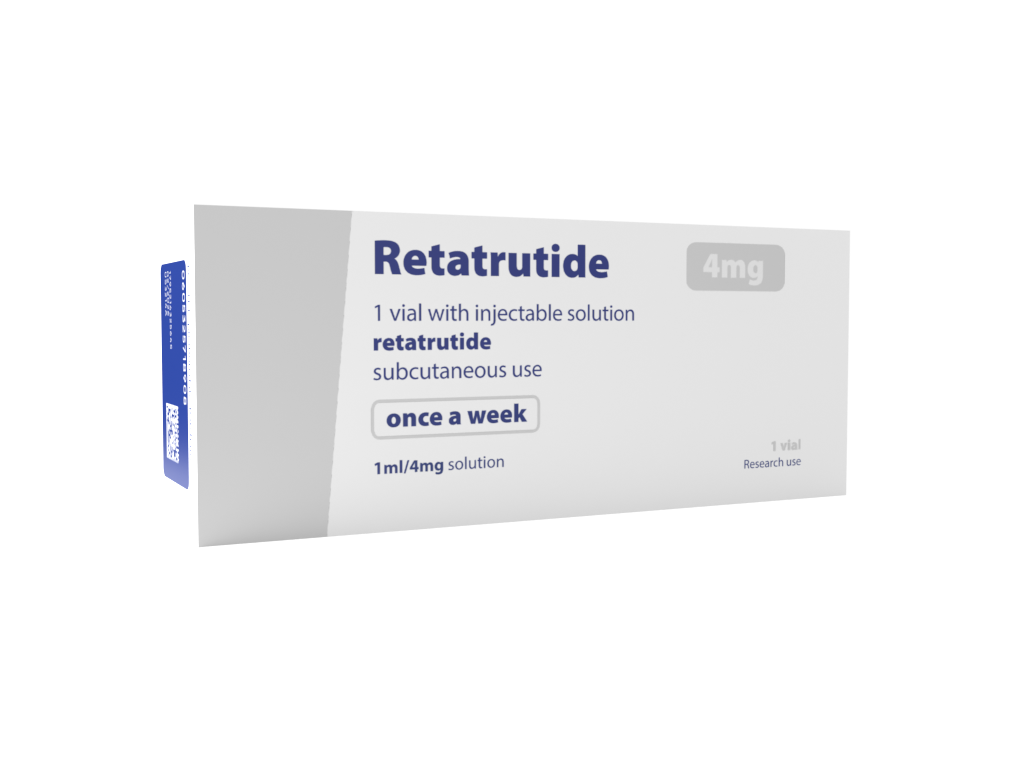Retatrutide - a new drug in the fight against obesity
Obesity is a significant problem. It affects a huge number of people and the number is growing all the time. The use of drugs to treat obesity has become a popular approach. This is especially true in cases where traditional methods, such as diet and physical activity, do not work. Retatrutide, a new drug in the field, offers new hope for people struggling with excessive body weight. This article aims to discuss in detail retatrutide, its mechanism of action, efficacy and potential side effects.

What is retatrutide?
Retatrutide is a GLP-1 receptor drug that has been gaining popularity in recent years as a potential solution to obesity. It works through a hormonal mechanism, combining the effects of GLP-1 receptor agonists, GIP and glucagon. This innovative drug is designed to control feelings of hunger, regulate blood sugar levels and improve metabolism, which can contribute to faster weight loss.
Retatrutide - mechanism of action
Retatrutide stands out from other drugs due to its unique mechanism of action. The drug acts on three key hormones: GLP-1 (glucagon-like peptide-1), GIP (glucose-dependent insulinotropic polypeptide) and glucagon.
Action of GLP-1
GLP-1 is a hormone produced in the gut that plays a key role in regulating blood sugar levels and controlling appetite. Retatrutide increases the activity of this hormone, which makes the patient feel full faster and for longer. The increase in GLP-1 levels also leads to slower gastric emptying, further reducing the amount of food consumed.
GIP Action
GIP, like GLP-1, affects glucose metabolism by increasing insulin secretion after meals. The combined action of GLP-1 and GIP makes it retatrutide is more effective than other drugs that act on only one hormone. Increased GIP activity also improves tissue sensitivity to insulin, which is crucial for patients with obesity and type 2 diabetes.
The role of glucagon
The final component of the three-hormonal mechanism of retatrutide is glucagon. Glucagon increases the rate of fat metabolism, which promotes calorie burning and weight loss. In this way, the drug affects energy metabolism, contributing to weight loss even in people in whom other therapies have failed.
Efficacy of retatrutide
Results of clinical trials on retatrutite are promising. Patients taking the drug experienced significant weight loss compared to control groups that took placebo or other formulations. The study found that the average weight loss ranged from 15% to 20% of initial weight over several months of treatment.
Comparison with other drugs
Retatrutide, with its trihormonal mechanism of action, is superior in efficacy to many commercially available obesity drugs. Formulations acting only on GLP-1, such as semaglutide or liraglutide, can lead to weight reduction, but to a lesser extent than retatrutide. In comparative studies, patients taking retatrutide lost significantly more weight than those taking other formulations, making the drug highly hopeful for doctors and patients.
Possible side effects
Like any drug, retatrutide can cause side effects. The most common symptoms reported by patients are:
- Nausea
- Diarrhea
- Constipation
- Abdominal pains
Risks associated with long-term use
Some studies suggest that long-term use of GLP-1 drugs may be associated with a risk of pancreatitis. While this is a rare complication, doctors recommend caution in patients with a history of pancreatic disease. In addition, patients should be monitored for electrolyte disorders, especially if they have a history of recurrent diarrhea.
For whom is retatrutide intended?
Retatrutide is primarily indicated for obese patients in whom other methods of weight loss have proved ineffective. The drug can also be used in people with obesity coexisting with type 2 diabetes, as its action helps control blood glucose levels. However, it is important that the treatment is carried out under the supervision of a doctor, who will assess whether the patient qualifies for the therapy.
Indications and contraindications
Retatrutide is not suitable for everyone. Contraindications include patients with severe pancreatic conditions, as well as people with certain types of endocrine tumors. Pregnant or breastfeeding women should also avoid this drug, unless their doctor decides otherwise.
Retatrutide as part of comprehensive obesity treatment
Obesity is a multifactorial disease, which means that treatment should not be limited to medication alone. Retatrutide can be an effective tool in the fight against excess weight, but the best results are achieved by combining pharmacotherapy with a proper diet, regular physical activity and lifestyle changes.
The role of physical activity
Drug treatment should be supplemented with daily physical activity. Regular exercise, such as walking, running or weight training, can not only accelerate weight loss, but also improve overall health.
Importance of diet
Diet plays a key role in weight loss. The use of retatrutide should go hand in hand with a well-balanced diet, rich in protein, healthy fats and carbohydrates with a low glycemic index. Limiting the intake of processed foods, sugar and trans fats can significantly increase the effectiveness of the therapy.
Is retatrutide the future of obesity treatment?
Retatrutide is one of the most promising obesity drugs currently on the market. Its efficacy, confirmed by clinical trials, and its innovative mechanism of action make it likely to become an important element in the treatment of overweight and obese people. With advances in research and medical development, it is possible that even more effective therapies based on hormonal approaches to weight control will emerge.
Source:


